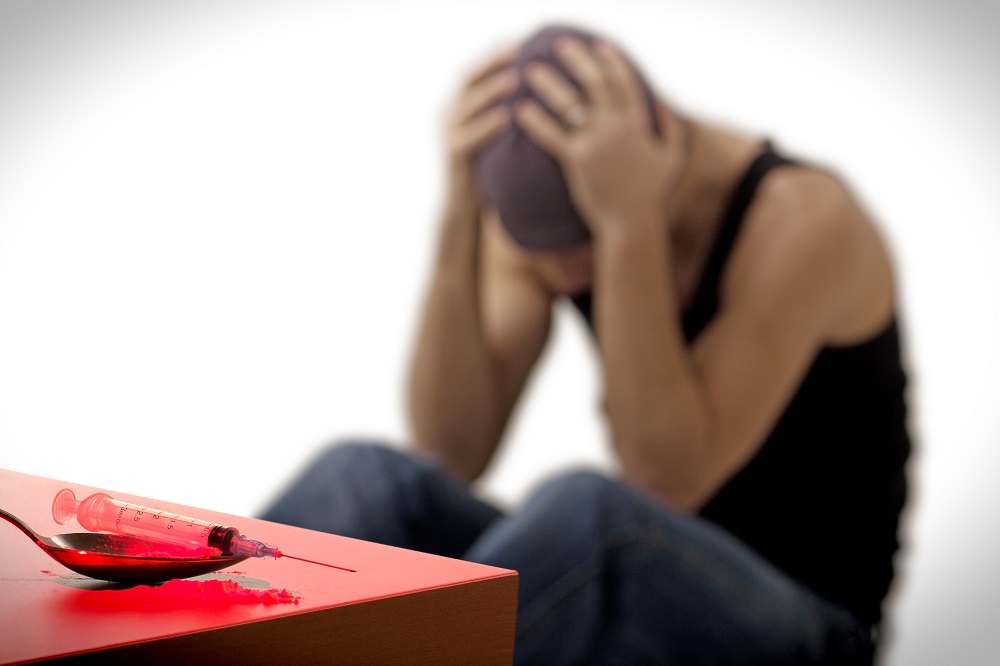Addiction to Heroin
Heroin is a potent opiate with an intense effect on the brain reward system. Heroin rigs this reward system by influencing the production of feel-good chemicals in the brain, such as dopamine and endorphins.
“Out of everyone who tries heroin for the first time, nearly one in four become addicted.”
In normal circumstances, the brain releases these chemicals to reward behavior necessary for survival, like eating, and helping people cope with pain.
The brain quickly links heroin to the activation of these chemicals in the brain reward system. Eventually the user becomes addicted and can’t function without the drug. This, along with the withdrawal symptoms of heroin, makes it hard for users to quit on their own.
Understanding Heroin
Heroin is a highly addictive painkiller synthesized from morphine, which comes from the seeds of the poppy plant. Because poppy plants are used to make opium, any drugs derived from them are considered opiates. Both heroin and morphine are opiates.
Heroin is also known by names like junk, smack or “H.” Street heroin is often combined with dangerous additives like morphine or the powerful pain reliever fentanyl.
Approximately four million Americans have tried heroin at least once in their lifetime. Symptoms of prolonged heroin use can include severe itchiness, depression and collapsed veins.
Heroin Effects
Heroin users have described the drug’s high as an intense feeling of well-being. When someone injects heroin, they often experience a “rush” from the drug reaching the brain so quickly.
The rush from intravenous heroin use lasts about two minutes. Intravenous users have likened the rush to an orgasm in terms of pleasure. As heroin travels through the bloodstream, the high lasts for four to five hours.
The general effects of using heroin include:
- Contentment
- Reduced anxiety
- Relieved tension
- Drowsiness
- Apathy
The effects of heroin can seem harmless to those who are experimenting with the drug. Although it may produce some dizziness and drowsiness, these effects feel enjoyable. Unlike substances such as alcohol or ecstasy, there generally isn’t a hangover or comedown from initial heroin use, which is an attractive benefit to new users.
What may seem like “harmless” or occasional heroin use often devolves into addiction because tolerance builds quickly. Eventually, the user cannot feel normal without taking the drug because their brain cannot produce natural amounts of dopamine on its own. As the user increases their doses, they are at a greater risk of fatal heroin overdose.
Signs of a heroin overdose include:
- Shallow breathing
- Dry mouth
- Tongue discoloration
- Very small pupils
- Slow pulse
- Bluish lips
Heroin Detox Admissions
Signs of Heroin Use
Heroin is one of the most addictive drugs available. No one intends on becoming addicted to heroin, but many people using it eventually find themselves unable to feel normal without it. It can be hard to detect when someone is using heroin, and many users are good at hiding it.
While needle or “track” marks are a telltale sign of heroin abuse, it’s rare that new users inject the drug.
Some signs of heroin abuse are:
- Bloodshot eyes
- Constricted “pinpoint” pupils
- Sudden weight loss
- Secretive behavior
- Changes in appearance
- Lack of motivation
- Extreme drowsiness or nodding off
- Financial problems, borrowing money
The Dangers of Heroin
Most people know that heroin is one of the most dangerous drugs because of its addictive potential. There are also short- and long-term effects of the drug, as well as indirect risks that can be life-threatening.
Heroin users have a higher risk of being infected with viruses like HIV or hepatitis.
Blood-borne viruses pose a risk for people addicted to heroin because they often inject the drug and share their needles. Risky sexual behavior can also contribute to higher rates of viruses among heroin users. There is also a high risk of spontaneous abortion for pregnant women.
People who are addicted to heroin have an increased risk of attempting suicide. Sometimes suicides are committed through intentional overdoses. Heroin abusers who are also suffering from underlying mental conditions, such as depression or bipolar disorder, have a compounded risk of suicide.
Sometimes the resulting depression that comes with withdrawal is enough to trigger a suicide attempt. If you or someone you love is struggling with a heroin problem, get in touch with us now for help.
Other symptoms of heroin addition include:
- Depression
- Constipation
- Slurred speech
- Paranoia
- Shortness of breath
- Collapsed veins
- Severe itchiness
- Dry mouth
- Nausea and vomiting
The side effects of heroin use get worse over time. The longer someone uses heroin, the more destruction the drug can wreak on the immune system and internal organs. The risk for getting both communicable and noncommunicable diseases increases. Prolonged heroin abuse can also lead to heart, lung and liver disease.
Heroin suppresses breathing and heart rates, so there is a high risk of fatal overdose. Even a nonfatal overdose can cause permanent brain damage or coma.
The Centers for Disease Control estimated that approximately 8,000 Americans died from heroin-related overdoses in 2013.
Heroin Detox Admissions
What Is Heroin Withdrawal?
Heroin impacts the brain reward system, increasing the user’s tolerance to the drug’s effects over time.
The user eventually needs higher doses to reach the same “high” as before. When someone addicted to heroin stops using, withdrawal symptoms set in.
People battling heroin addiction often keep using to avoid painful symptoms of withdrawal. Abusing heroin produces effects similar to painkillers like oxycodone and hydrocodone, only stronger.
Withdrawal from heroin is often more intense than those of prescription painkillers.
Withdrawal Symptoms
Users begin experiencing withdrawal within twelve hours of their last heroin dose. Withdrawal from heroin may resemble those of prescription opioids. Because heroin leaves the user’s system faster than painkillers do, withdrawal comes about more quickly.
Withdrawal often feels like a horrible case of the flu. The worst pain and discomfort lasts a week — about as long as a bad flu — with withdrawal symptoms peaking during the second or third day.
Common symptoms of withdrawal include:
- Nausea and vomiting
- Insomnia
- Agitation
- Diarrhea
- Dilated pupils
- Sweating
- Anxiety
- Abdominal cramping
- Muscle aches
Duration of Withdrawal
The length of withdrawal from heroin depends on several factors.
The amount of the drug and period of time over which it was taken can impact how long withdrawal lasts.
Depending on the level and length of use, recovering heroin addicts might suffer post-acute withdrawal symptoms. Prolonged heroin use changes the brain’s chemical makeup. The effects on mood and behavior can last months after other withdrawal symptoms pass. Some of these long-lasting symptoms might include anxiety, depression, fatigue, insomnia and irritability.
Heroin Detox Admissions
Mandala’s Heroin Detox Approach
Treating an addiction to heroin usually involves therapy, medication, support groups and lifestyle changes. These treatments are available at both inpatient and outpatient treatment centers.
Due to the symptoms of withdrawal and the psychological grip heroin has on its users, a professional treatment center usually offers the best chances of a successful recovery.
Detox is the first step toward overcoming heroin. It’s best not to try detoxing without the help of a physician. Heroin withdrawal is often painful and can last weeks for some, but physicians can prescribe medication that can minimize discomfort and help the body slowly readjust.
Therapy is also an important aspect for tackling the underlying behaviors that led to a person’s heroin use. Therapy can also tackle co-occurring disorders like depression.
We are committed to providing quality care and memorable experiences.
We will consistently exceed expectations and inspire those we serve.
We treat those we serve with compassion, dignity, and respect.
Heroin Addiction Medications
Medical management is important in helping wean individuals off heroin by helping to reduce cravings and prevent future use. Some medications commonly prescribed to people addicted to heroin include:
-
Buprenorphine
As an opioid, buprenorphine interacts with the same receptors as heroin, though its effects are limited. This helps with withdrawal and cravings.
-
Methadone
Although stronger than buprenorphine, methadone essentially works in the same way. Methadone use is controversial because it can build up in the body if taken too often, making overdose more likely; it is also potentially addictive itself.
-
Naltrexone
Also used in treating alcoholism, naltrexone blocks opioid receptors. This reduces cravings and prevents heroin from having an effect when taken.
-
Suboxone
This is a combination of buprenorphine and naltrexone. This combination not only relieves withdrawal pain, but also inhibits the effects of heroin.
Our phone number is available 24/7 to help you or your loved one find a treatment center that suits your needs. It only takes one call to start your new life in recovery.
















